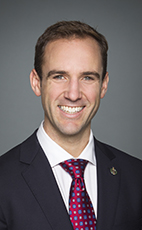Madam Speaker, I want to assure my colleague across the way that as the Minister of Border Security works with his colleagues in the U.S. to modernize the safe third country agreement and as our government works to properly triage and provide refuge to irregular migrants in accordance with Canadian law in our international obligations, I am happy to stand and remind the member opposite of the humanitarian leadership, the action taken and the results delivered by this government over the last number of years.
To begin, I would remind her of the national effort that led to the welcoming and resettlement of over 50,000 Syrians in less than two years.
Thanks to the generosity of Canadians across the country, we were able to give these refugees hope and a fresh start. The quick and efficient resettlement of Syrian refugees by Canada was praised around the world.
As well, I would remind the House and Canadians that our government has provided assistance to survivors of Daesh and their family members, including vulnerable Yazidi women and children.
Since December 31, 2017, Canada has issued just over 1,200 visas to survivors of Daesh sponsored by the government. We worked closely with several international organizations to ensure their safe travel and to help them resettle in Canada.
Canada has earned a reputation as a recognized international leader as well in settlement and integration. Newcomers to Canada receive the information that they need about life in Canada as well as the communities in which they intend to settle. They receive language training. They receive help finding a job. They connect with established immigrants and Canadians to help survey the community, get around and become comfortable.
Once they are here, immigrants and refugees have access to a full suite of settlement supports and services provided by over 500 specialized service provider organizations from coast to coast to coast in all regions of Canada.
Our government is also making significant new investments in our settlement programming, and we have enhanced coordination with our provincial and territorial counterparts to ensure stronger outcomes, particularly for refugees.
When it comes to planning resettlement, under our multi-year immigration levels plan, government-assisted refugees landing in Canada will increase from 7,500 in 2018 to 10,000 government-assisted refugees in 2020. That is an increase of over 33%. Our plan to resettle 18,000 privately-sponsored refugees in 2018 is more than triple what was in place when we took power in 2018. Also, under this government, Canada's 2018 target to resettle refugees has doubled to 20,000 refugees across all streams.
Finally, in budget 2018, our government announced a new commitment to welcome and resettle an additional 1,000 vulnerable women and girls, who we know will be welcomed with open arms in Canada. This additional 1,000 refugees are in addition to the government-assisted refugee targets in our multi-year immigration levels plan, and are accompanied by the appropriate budget allocations to ensure its success.
I conclude by saying we continue to show leadership on the international stage in our humanitarian efforts.

